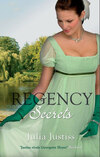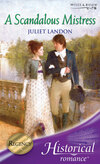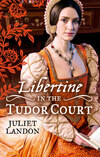Buch lesen: «Regency Rumours»

About the Author
JULIET LANDON’s keen interest in art and history, both of which she used to teach, combined with a fertile imagination, make writing historical novels a favourite occupation. She is particularly interested in researching the medieval and the problems encountered by women in a man’s world. Her heart’s home is in her native North Yorkshire, but now she lives happily in a Hampshire village close to her family. Her first books, which were on embroidery and design, were published under her own name of Jan Messent.
Don’t miss these other Regency delights from Mills & Boon® Historical romance’s bestselling authors!
REGENCY PLEASURES
Louise Allen
REGENCY SECRETS
Julia Justiss
REGENCY RUMOURS
Juliet Landon
REGENCY REDEMPTION
Christine Merrill
REGENCY DEBUTANTES
Margaret McPhee
REGENCY IMPROPRIETIES
Diane Gaston
REGENCY MISTRESSES
Mary Brendan
REGENCY REBELS
Deb Marlowe
REGENCY SCANDALS
Sophia James
REGENCY MARRIAGES
Elizabeth Rolls
REGENCY INNOCENTS
Annie Burrows
REGENCY SINS
Bronwyn Scott
REGENCY
Rumours
Juliet Landon

MILLS & BOON
Before you start reading, why not sign up?
Thank you for downloading this Mills & Boon book. If you want to hear about exclusive discounts, special offers and competitions, sign up to our email newsletter today!
Or simply visit
Mills & Boon emails are completely free to receive and you can unsubscribe at any time via the link in any email we send you.
A Scandalous Mistress
Juliet Landon
Chapter One

The steel of the younger man’s foil made an arc against the padded waistcoat of his opponent and sprang back into shape, its point lowered to the ground. Laughing at his own failure, the Marquess of Sheen threw up an arm to acknowledge the scatterred applause. ‘Well done, my boy,’ he called, passing his foil to the appreciative fencing master. ‘Am I ever going to beat you again, I wonder?’
‘Not if I can help it, sir,’ said Lord Nicholas Elyot, removing his mask. ‘It’s taken me long enough to get to this stage.’ He shook his father’s offered hand, admiring the agility of the fifty-two-year-old body as well as the strength in his fingers, the keen brown eyes, the quick reflexes. As usual, he failed to perceive their similarities in the same way that others did, particularly Mr O’Shaunessy, the proprieter, who could see in Lord Elyot an exact replica of his father at the age of thirty, tall and broad-shouldered, slender-hipped and lithe, with legs like a Greek god. The dark, almost black hair that tousled thickly about the son’s handsome face was, on the Marquess, as white as snow and still as dense, and the mouths that broke into sympathetic smiles would have stopped the heart and protests of any woman. As they often had; both of them.
They sat together to watch the next contestants, the Marquess leaning back against the wall, his son leaning forward with arms along thighs. ‘Not below par, are you, Father?’ said Lord Elyot.
There was a huff of denial. ‘Nay, I could claim that as an excuse but it ain’t so, m’boy. Never better. Top form. M’mind on too many things at once, I suppose.’ The Marquess glanced at his son’s strong profile. ‘Well, I have to make up some reason, don’t I?’
Lord Elyot leaned back. ‘Only this once, sir. Where’s the problem, Richmond or London?’
‘Richmond, Nick. You say you’re going back tomorrow?’
‘Yes, a few loose ends to tie up here first, then I’ll be off. It’s been almost five weeks. Time I was attending to things.’
‘Petticoat problems, is it? You still seeing that Selina Whats it?’
‘Miss Selena Whats it,’ said Nick, ‘departed my company weeks ago, Father. You’re way out of date.’ He began to unbutton his shirt.
‘By how many?’
‘Oh, I dunno. A few. Thing is, I think it’s time our Seton was taken back home before he strays into dun territory. No, don’t be alarmed, he ain’t there yet, but he soon will be if he stays here in London much longer. There’s plenty to keep him occupied in Richmond. He can do the rounds with me and the bailiff and the steward for a start, and get some good air into his lungs. I can find ways of keeping his hands out of his breeches pockets.’
‘You might want him to help you with a bit of investigating too, in that case. That may keep him busy.’
‘What’s to do, sir? Poachers again?’
‘No, nothing so simple. Some complaints from the Vestry about interference in parish affairs.’
‘By whom?’
‘Ah, well, that’s the problem, you see. They don’t know. Let’s go and get changed and I’ll tell you about it.’
As with other noblemen who took their role in society seriously, the Marquess of Sheen, whose ancestral home was at Richmond, in the county of Surrey, had several professional obligations, one of which was to King George III to whom he was Assistant Master of Horse, and another to the Bench where he sat as Justice of the Peace. The obligation to his estate at Richmond was administered in his absence by his eldest son, Lord Nicholas Elyot, who would have to perform those same duties sooner or later anyway, so had no objection to taking that particular burden off his father’s shoulders. Only a two-hour drive away from London, on a good day, Richmond lay further up the River Thames, and its parish council, the Vestry, was made up of stalwart citizens of good standing, including the church minister, the local schoolmaster, landowners and the squire, who was the Marquess himself. The Vestry’s purpose was to deal with matters like street-lighting and the maintenance of roads, fires, crime and poverty. Criminals, who were almost always poor also, were locked into the local pound until they could be sentenced, while other unfortunates were sent to the workhouse, which, although it provided shelter and food, usually did little else for their creature comforts. It was regarded as a last resort.
‘Somebody,’ said the Marquess, ‘is playing a deep game, bribing the workhouse staff to release two young women in the family way who’ve only just been admitted.’
‘And the Vestry don’t know who it is?’
‘Nope. Mind you, they’ve been pocketing the blunt fast enough and not asking too many questions, but it’s got to be stopped, Nick. Apart from that, one or two debtors and a child have been sneaked out of the pound at night, and nobody knows who’s responsible. No law against paying a debtor’s debts to get ‘em released, as you know, but it has to be done through the proper channels, not by forcing the padlocks or slipping a fistful o’ town bronze to the night doorman. It’s got to stop,’ he repeated.
‘So you want me to find out who’s behind it. Could it be a member of the Vestry, d’ye think? Someone with a grudge?’
‘I doubt it. The Vestry have complained to me, so what I’m after is some juicy background information on whoever it is, enough to…er…persuade them to go and do their good turns somewhere else. I don’t want to raise the hue and cry about it, just a little discreet blackmail will do. A threat of prosecution, if you like. It is an offence, after all.’
‘Is it?’ Nick smiled.
‘Oh, yes. Abduction,’ said the Marquess, airily. ‘And perverting the course of justice, too.’
‘Coming it a bit strong, Father?’
‘We…ell, maybe. But I can’t have the Vestry upset. They run the show while I’m here, you know. Special headquarters on Paradise Road. They like to be seen to be effective.’
‘Which I’m sure they are, sir. I’ll look into it immediately. Shouldn’t take long. I’ll let you know.’ Nick shrugged his substantial shoulders into the immaculate dark grey morning coat and allowed the valet to adjust the lapels, the cuffs, the waistcoat and snowy neckcloth with fastidious care. Looking down at his glossy black Hessians, he indicated a speck of dust on one toe. The valet dropped to his knees to attend to it, then stood to hand Lord Elyot a beaver hat, a pair of soft kid gloves and a polished cane with a silver knob.
‘Shall we see you at St James’s Square for dinner?’ said the Marquess.
‘I’m not sure, sir. Shall I let you know later?’
‘Of course. And don’t forget your sister’s birthday this month.’
‘Heavens! Is it August already?’
‘No, m’boy, it’s been September these last two days.’
‘Really? How old is she?’
‘Lord, lad! How should I know? Ask your mother at dinner.’
They parted with a bow and a look that was not nearly as serious as their mutual ignorance of family birthdays would suggest.
Within the shining reflective precincts of Rundell, Bridge and Rundell on Ludgate Hill, the atmosphere was hushed, even churchlike, where white-aproned black-vested assistants spoke in reverential whispers, bowed, smiled and agreed with their well-heeled patrons who could afford not to notice the price of the wares. It would have been of little use to pass the doorman if money was a problem, for Rundell’s was the most fashionable goldsmith in London where nothing came cheap and where, if it had, none of their customers would want to buy it.
That much Lady Amelie Chester had gathered from the pages of the Ladies’ Magazine, and she had made a point of not returning from her first visit to the capital without seeing for herself what all the fuss was about. She had kept her barouche waiting for the best part of an hour while her coachman had driven the length of Ludgate and back several times so as not to keep the horses standing too long, and still there were choices to be made and the wink of a jewel to catch her eye. The ridiculously brief list she had brought had long since been discarded. She smiled at her two companions who hovered nearby, clearly not as enamoured by the Aladdin’s Cave as she was.
The plainly dressed one holding a Kashmir shawl over one arm smiled back. ‘Miss Chester is getting a bit fidgety, my lady,’ she whispered, glancing at the girlish frills and bows disappearing behind a glass cabinet.
Miss Caterina Chester, the bored seventeen-year-old niece of the avid purchaser, had at last seen something she liked, which could best be observed through a display of silver candlesticks and cruets. Two men had stepped into the shop to stand quietly talking long enough for her to see that they were related, that one was perhaps nearing thirty, the other his junior by a few years. Both, without question, were veritable blades of distinction, the best she had seen all day. And she had been looking, almost without let-up.
Her practised young eye knew exactly what to expect from a pink of the ton; nothing flamboyant, everything perfectly cut, clean, stylish and fitting like a second skin over muscled thighs and slim hips and, although there would be some gathering at the top of the sleeves, there must be no hint of padding or corseting. These two were true nonpareils.
They were a comely pair, too, she told herself, comparing them. The elder one with the more authoritative air would have been in the army, she guessed, while the other, like herself, would be thinking that he could find more interesting things to do than this. Of one fact she was sure, however: neither of them would be in Rundell, Bridge and Rundell’s unless they had wealth.
It was inevitable, she knew, that their attention would veer like a weathervane towards her aunt, Lady Amelie Chester, who had turned so many heads that day it was a wonder they had stayed on shoulders. No matter where she went, or did, or didn’t do, for that matter, men would stare, nudge and whistle rudely through their teeth at Aunt Amelie. Envious women looked for weaknesses in her appearance and gave up in disgust that the dice could be so heavily loaded in one person’s favour.
Watching them carefully, Caterina saw the younger man’s lips form a pucker, putting his hand to the quizzing-glass that hung upon his buff waistcoat and dropping it again at the three quiet words from his companion. Then, like cats stalking a kill, they moved nearer.
Lady Chester had come to a decision and, in a state of near euphoria, was oblivious to all else. Having recently rid herself of an old-fashioned teapoy on a leggy stand, she was delighted to have found a small silver caddy made by the Batemans, topped with an acorn finial and handled with ivory. Before the enraptured assistant had finished praising her choice, she spied a beehive-shaped gilt honey pot with a bee on top. Her gloved fingers caressed its ridges. ‘This,’ she said, ‘is perfect.’
‘Paul Storr, m’lady,’ the assistant smirked. ‘We hope to acquire more of his work in the future. It came in only yesterday.’
‘Then I’m sure it will be happy in Richmond,’ she said. ‘Add it to the others, if you please. I’ll take it.’
The elder of the two men moved forward. ‘Richmond?’ he said. ‘I thought I knew everyone in Richmond. I beg your pardon, ma’am. We have not been introduced, but pray allow me to take the liberty of performing my own introduction, since there is no one else to do it for me. Nicholas Elyot at your service. And my brother, Seton Rayne.’
The assistant intervened. ‘My lords,’ he said, bowing.
‘Amelie Chester.’ Amelie dipped a curtsy of just the correct depth while Caterina moved round the glass case to watch, fascinated and not too proud to learn a thing or two about how Aunt Amelie caused men to vie for her attention. One day, she would do the same. Her aunt neither smiled nor simpered as so many women did to gain a man’s interest, Caterina noticed, watching the graceful incline of her head. A soft-brimmed velvet hat covered the rich brown hair escaping in wayward spirals around her ears to accentuate the smooth peachy skin over high cheekbones. Her eyes were bewitchingly dark and almond-shaped, her brows fine and delicately arched, and there was no feature, thought Caterina, that needed the aid of cosmetics.
On the verge of leaving half-mourning behind her, Lady Chester’s pelisse was of three-quarter-length pale violet velvet with a swansdown collar worn over a silver-grey silk day dress. The edges of the velvet sleeves were caught together at intervals with covered buttons, and a capacious reticule of matching beaded velvet hung from one arm. The only ornament on the rather masculine hat was a large silver buckle into which was tucked a piece of swansdown, and the effect of all this on the two men, Caterina thought, was as much a sight to behold as her aunt’s classic elegance. Surreptitiously, she removed the fussy lace tippet from around her shoulders that she had insisted on wearing and passed it to Lise, her aunt’s maid.
The brothers removed their tall hats and bowed in unison. ‘You are staying here in London, my lady?’ said Lord Elyot.
His voice, she thought, was like dark brown chocolate. ‘No, my lord. Only to shop. We must leave soon, now the days are shortening,’ she said.
‘Indeed. You’ll need all the light we have left. Have you been long in Richmond? How could we have missed seeing you there?’
A smile lit up the almond eyes at last with the lift of her brow. ‘As to that, sir, anyone could miss us quite easily, even at church. My niece and I have seen little of society since we arrived. May I introduce her to you? Miss Caterina Chester.’
At last, Caterina’s moment had arrived. She stepped forward from her vantage point to make the prettiest bob she could devise while she had their entire attention and, though she ought to have kept her eyes demurely lowered, her natural urge to discover what effect she was having got the better of her.
‘My lords,’ she whispered, allowing her bright golden-brown eyes to reach the younger lord’s attentive face for another glimpse of his crisp dark thatch before he replaced his hat. It seemed to fall quite naturally into the correct disorder but his eyes, she noticed, held only a neutral attempt at friendship before focussing once more upon her aunt. Inwardly, she sighed.
Lord Elyot, however, saw that one of his queries had been avoided. ‘Is your stay in Richmond permanent, Miss Chester?’ he said.
‘Oh, yes, my lord. We’ve been there only five weeks and two days and there’s such a lot for us yet to see.’ And do, she thought. Again, her gaze turned hopefully in Lord Rayne’s direction, but noticed only the quizzical nature of his examination of her over-frilled and beribboned day dress and braided spencer, her flower-bedecked bonnet and the lace gloves that she had believed were all the thing. Until now.
‘Oh, you’ll need several seasons to see all that London has to offer,’ Lord Elyot replied, ‘but shopping must come first. My brother and I called in to purchase a gift for our sister’s birthday, but we possess neither the flair nor the time to find exactly the right thing. I wonder, my lady…’ he returned his attention to Amelie ‘.if you and your niece could help us out. Your taste,’ he continued, glancing at the counter covered with pieces she had bought, ‘is obviously of the most sophisticated. Do you have any suggestions as to what would please a sister most?’
‘Without knowing her, sir, that would be difficult. Is she single or married? Young or…how old will she be?’
The two men exchanged blank stares until Lord Rayne offered some statistics he was reasonably sure of. ‘Well, she’s three years older than me, married with two bra… bairns…er, children.’
‘And she’s two…no, three years younger than me,’ said his brother. ‘Does that help?’
Amelie’s smile might have grown into a laugh but for her effort to contain it, and Caterina noted again the devastating effect this gentle bubbling had on the two men, for it was genuine yet controlled. ‘That is some help. Does she have a star sign?’ Amelie prompted, twinkling.
The blankness returned.
‘The beginning of September? Or the middle?’
‘The end,’ said Lord Rayne, warming to the theme.
‘No, somewhere near the middle,’ said Lord Elyot. ‘I think. Look, may we leave this with you, if you’d be so kind? Mr Bowyer here will charge the cost to my account and send it to Richmond. We’re in a bit of a hurry.’
Smiling broadly, Mr Bowyer assented.
Amelie agreed, wondering at the same time why they had stopped to choose a gift if they were in so much of a hurry. ‘Of course,’ she said. ‘Miss Chester and I will surely find something appropriate in here.’
Lord Elyot bowed. ‘You are too kind,’ he said, formally. ‘I am in your debt, my lady. I hope we shall meet in Richmond.’
There was something about his eyelids, Amelie thought. He was a man of experience, and he knew how to look at a woman to make her feel as if she were the only person in the room to matter to him. He had spoken to Caterina like that too, and the child had noticed and wished the brother had done the same.
Bows and curtsies were exchanged once more and the meeting was curtailed as Caterina instantly began a search for something that would fritter away someone else’s money. The men made for the door, their voices carrying easily across the subdued interior.
‘I didn’t know we were in so much of a hurry, Nick.’
‘Well, we are. We need to return to Richmond tonight. A problem to sort out for Father. Rather urgent.’
‘What kind of a problem?’
Lord Elyot tucked his cane beneath one arm and picked up a silver snuff-box, turning it over to examine the base. ‘Oh, just some loose screw or other springing young nob-thatchers and bairns from the local workhouse,’ the deep voice drawled softly, distinctly bored. ‘Anybody who thinks that a bit o’skirt with a bun in the oven is worth rescuing must be an addle-pate, don’t you agree, young Rayne? But the Vestry want it stopped. It’s only a twenty-four-hour job, but we have to make a start before we get a new plague of vagabonds. You can help, if you like.’ He replaced the snuff-box. ‘Come on. It won’t take all that long, then we can go and look at some new cattle, eh?’
‘Stupid do-gooders! Ought to be locked up themselves. If only they knew the trouble they cause.’
They passed out of the shop into the sudden clamour of Ludgate Hill, where the street-criers and rattle of wheels drowned the rest of their conversation, and Amelie was left doing what her niece had done earlier through salt-cellars and candlesticks. She watched them pause as her own barouche drew to a standstill outside the shop and the footman leapt down to hold the horses’ heads. Her heart hammered with sudden fear.
Loose screw…springing young nob-thatchers and bairns from the local workhouse…bit o’skirt with a bun in the oven…do-gooders…
It was not so much the vulgar cant that raised Amelie’s hackles, for the men were entitled to say what they wished when they were alone; it was the revelation that they had a particular problem to solve for their father, whoever he was, which was apparently upsetting both him and the Vestry. And without a shadow of a doubt they were, without knowing it, speaking of her, Lady Amelie Chester, for she was the ‘do-gooder’ in question whose deep commitment to the plight of unfortunate women would never be understood by toffs of their kind who didn’t know the date of their sister’s birthday, or even how old she was. She felt the surge of fury, resentment and disappointment like a pain as she heard their mocking voices again. She watched them linger outside to examine her new coffee-coloured barouche with its cream-and-brown striped upholstery, its Italian lamps, the dapple-grey horses, the eight-caped coachman and liveried footman in brown and pale grey as neat as could be. They would not find any cattle to beat that showy pair, she thought, turning away with a frown. It had all ended on a very sour note, for she had liked their manner until then. She would find it even more difficult to fulfil her promise now she had seen the kind of men she had agreed to oblige. ‘Caterina dear, have you seen anything suitable?’ she said.
Wallowing almost knee-deep in expensive metalware, her niece had suddenly become animated and was eyeing a pair of very pretty silver chinoiserie cake-baskets that Amelie would not have minded owning.
‘Mm…m,’ Amelie said. ‘Pretty, but…’
‘Well, then, what about a large salver? They’re always useful. One cannot have too many salvers, can one?’
The catalyst was the word ‘useful'. If there was anything a woman disliked being given for her birthday, it came into the ‘useful’ category unless, of course, she had asked for it. Like a carriage and a pair of horses. Eagerly, she looked around for the largest, the most tasteless and most expensive ‘useful’ item on display, though it was Caterina who spotted it first, a massive silver and gilt tea urn with three busty sphinxes holding up the bowl on their wings and a tap that swung away like a cobra about to strike. Standing on an ugly triangular base, it was a monstrous reminder of Lord Nelson’s recent victory in Egypt.
‘What if she doesn’t drink tea, though?’ whispered Caterina, without knowing how she and her aunt were working at cross-purposes. ‘It looks very expensive.’
All the better. ‘Oh, she’s sure to, dear.’
‘Is it in good taste?’ Caterina queried, having doubts.
Amelie was careful here. ‘It will depend,’ she said, cautiously, ‘on what their sister’s preferences are, I suppose. If she has a growing family and plenty of visitors, then a large urn will be just the thing.’ And it would go some way, she thought, towards mollifying her resentment at the insensitive, not to say inhuman, attitude of the two brothers who, she hoped, would not follow up their introduction with anything more presumptuous.
But although the purchase of the vastly overpriced and vulgar gift had evened the score for Amelie in one direction, there was yet a more serious one to consider, calling for a return home at a faster pace than their earlier ride into London. There was now no time to lose. ‘Lise, go and tell the footman we’re ready to go home,’ she said.
The stares of admiration directed at the beautiful coffee-coloured barouche and the Dalmatian running behind were only vaguely heeded on the return journey to Richmond, for the event that concluded their shopping spree weighed heavily on Amelie’s mind, making her realise yet again that, however good it was to be an independent woman, she was still vulnerable without the comforting support of her husband.
Sir Josiah Chester had been taken from her with a frightening suddenness two years ago, a most unusual two years that left her with few relatives close enough to assist her through the worst months, the problems of inheritance and estate. The only one of their number whose help had been constant and ungrudging was Sir Josiah’s younger brother Stephen, himself a widower with a young family, of whom Caterina was the eldest.
It had been to thank Stephen for his generous support that she had agreed to take Caterina with her when she moved down to Richmond. Had it not been for that debt which she owed him, for his plea, and for Caterina’s motherless state, she would have made the move alone, which had been her first intention. She had no wish to stay in the Derbyshire town of Buxton for, although she had been happy enough there for her first twenty-two years, the two years after that had pointed out with brutal reality who she could depend on for true friendship.
Caterina’s joy at being taken to live with her, though flattering, was not what Amelie had wanted, and the inevitable conflict of interests had not been satisfactorily resolved in their first few weeks. Caterina had expected to make a new set of friends and to be received almost instantly into high society. Amelie had not the heart to explain either to Caterina or to her grateful father, that the fickleness of high society was something she would rather have shunned than sought, and that the reason she had chosen Richmond was for its proximity to Kew Gardens, to Hampton Court Palace, to the famed Chelsea Physic Garden and to Royal Academy exhibitions. The day’s shopping in London, though necessary, had been more the result of a guilty conscience than for Amelie’s own pleasure, not having tried as hard as she might to make contact with the local leading families, as Caterina had expected her to. The young lady’s very inadequate wardrobe had dictated the pattern of their shopping, and now the maid Lise sat beside a mountain of brown paper parcels that threatened to topple and bury her at each bounce of the carriage. Fortunately, there had not been room for the controversial tea urn, or Lise might have been critically injured.
The reason for Amelie’s accelerated haste to reach home was neither asked nor explained, as the clouding September sky was supposed by Caterina to be the cause. The truth, however, was more to do with Lord Elyot’s stated intention to attend directly to the problem of which the Vestry had complained.
Homeless mothers-to-be were often hustled over the boundary of one parish into the next, even during labour, to avoid the responsibility of more mouths to feed. Naturally, these women could not be let loose to give birth under hedges: untidy activities of that nature did not look well where refined citizens could be shocked by such sights. As a last resort, they had to be rounded up until it was all over, by which time the problem was often solved more permanently.
Sir Josiah Chester had not retained his vast wealth by giving it away to charitable causes, but by saving it; whether it was the powerful combination of childlessness, bereavement and wealth that gave rise to Amelie’s concern for waifs, strays and hopeless debtors, she had never tried to analyse, but the fact was that her acceptance of her new state had been smoothed by the help she had given to others less endowed and more distressed by far. She could be distressed in comfort, while they could not.
With a name as well known in Buxton as Sir Josiah’s, it had been relatively easy for Amelie, as a widow, to pay the debts of poor families threatened by imprisonment and worse and to find employment for petty criminals. She had given shelter and aid, sometimes in her own home, to pregnant homeless women and had found suitable places for them afterwards, had persuaded farmers’ wives to take in starving children and had poured money into improving the local workhouse facilities. The legacy she had received from her own wealthy parents had been exceptionally generous, and all that giving had made a greater difference to her sense of worth and general well-being than it had to her reserve of funds.
As long as she was actively helping the Vestry in Buxton to deal with their problems, no one had stood in her way, though nothing could stop the gossip of society women concerning the status of a young, wealthy and beautiful widow and the attentions of her brother-in-law, of supposed lovers and supposed rivals. The whisperings of scandal. It had been time for her to leave.
But in Richmond, the advantages associated with the name of Sir Josiah Chester had not opened the same doors as they had before, and all the help she had given so freely in Buxton now had to be done rather differently. In the dark. Anonymously. By bribery and deception and, if need be, by the useful burglary skills of a servant in her employ. It went without saying that she had far too many servants, most of them without references.
Last night, she had promised a distraught and heavily pregnant young woman, via the woman’s equally distressed companion, that she would help to release her from the workhouse where she was about to be taken. Amelie fully intended to go there that very night, and the last thing she needed was an extra guard on the gate put there by the interfering Lord Elyot. What on earth could have possessed her to agree to an introduction?



























